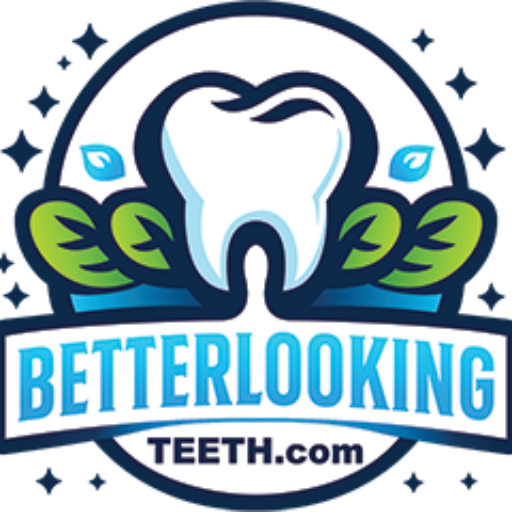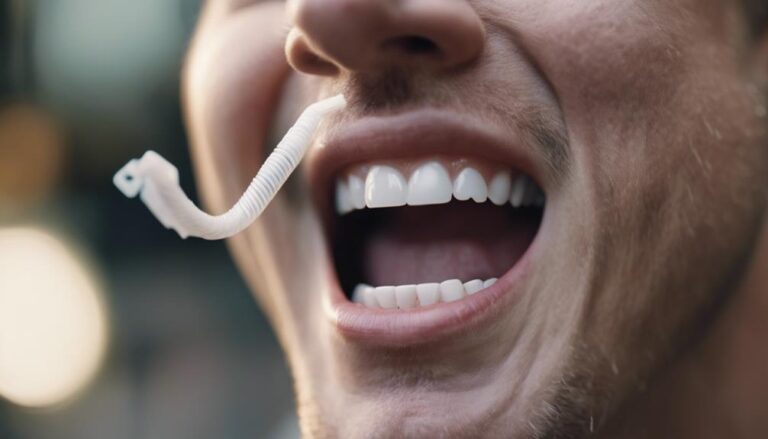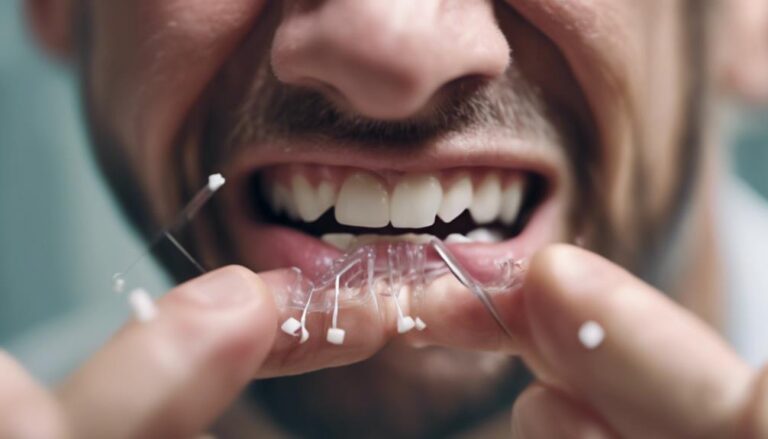Using home tools is essential to prevent gum disease. Regular brushing and proper flossing are necessary for excellent oral hygiene. Interdental brushes help clean between teeth, promoting gum health. Mouthwash complements your routine, maintaining healthy gums. Stress management techniques also benefit gum disease prevention. Additionally, home remedies like oil pulling and herbal supplements can improve oral health. Lifestyle habits, like a balanced diet and quitting smoking, impact gum health positively. Discover more ways to support your gum health for a brighter smile.
Key Takeaways
- Home tools like electric toothbrushes and water flossers enhance plaque removal efficiency.
- Daily use of home tools maintains oral hygiene and prevents gum disease effectively.
- Interdental brushes and tongue scrapers help clean hard-to-reach areas for gum health.
- Using home tools ensures consistent oral care, reducing the risk of gum disease development.
- Supplementing oral care routine with home tools supports overall gum health maintenance.
Benefits of Home Oral Care
Maintaining good oral hygiene at home is crucial for preventing gum disease and promoting overall dental health. In addition to regular brushing and flossing, incorporating dietary supplements rich in vitamins like vitamin C and D can support gum health. Vitamin C aids in collagen production, essential for healthy gums, while vitamin D helps in reducing inflammation.
Moreover, practicing yoga can also benefit oral health by reducing stress levels. High stress has been linked to gum disease, so managing stress through yoga practices can indirectly contribute to gum disease prevention.
When it comes to dietary supplements, it’s important to consult with a healthcare provider before adding them to your routine, as some supplements may interact with medications or have side effects. Similarly, before starting any new yoga practices, it’s advisable to learn from a qualified instructor to ensure proper techniques and avoid potential injuries.
Importance of Regular Brushing
Regular brushing is an essential aspect of daily oral care that plays a significant role in preventing gum disease and maintaining excellent dental health. It’s vital to understand that the impact of diet on oral health is undeniable. While diet impacts gum disease development, proper hygiene practices, including regular brushing, can mitigate these effects.
Brushing your teeth at least twice a day helps remove plaque, a sticky film of bacteria that forms on teeth. If left unaddressed, plaque can lead to gum disease. By incorporating regular brushing into your daily routine, you actively combat the accumulation of plaque and bacteria that contribute to gum inflammation and disease. Additionally, consistent brushing helps prevent cavities, bad breath, and other oral health issues.
Proper Flossing Techniques
To guarantee excellent oral health and prevent gum disease, mastering proper flossing techniques is crucial. Flossing should be done at least once a day to remove plaque and food particles that brushing alone may miss. The technique is as important as the frequency.
Use about 18 inches of floss, winding most of it around your middle fingers, leaving about one or two inches to work with. Gently slide the floss between your teeth using a back-and-forth motion, making sure to curve it into a C shape around the tooth and carefully move it under the gumline. Avoid snapping the floss, as it can harm the gums.
While traditional string floss is effective, there are alternatives like water flossers or interdental brushes that can be used depending on individual needs and preferences. Water flossers use a stream of water to clean between teeth, while interdental brushes are small brushes designed to fit between teeth. Experiment with different tools to find what works best for you, ensuring that you’re thorough and gentle to maintain excellent gum health.
Mouthwash for Gum Health
Using an effective mouthwash is a beneficial addition to your oral care routine for promoting gum health. Mouthwash benefits include reducing plaque buildup, fighting bacteria that cause gum disease, and freshening breath.
While there are various mouthwash options available, it’s crucial to select one that’s alcohol-free to prevent drying out the mouth, which can exacerbate gum issues. Natural mouthwash options, such as those containing tea tree oil or aloe vera, can be effective in promoting gum health without the use of harsh chemicals.
When choosing a mouthwash, look for products that have the American Dental Association (ADA) seal of approval to guarantee their effectiveness and safety. Incorporating mouthwash into your daily oral hygiene routine, along with proper brushing and flossing, can help maintain healthy gums and prevent gum disease.
Using Interdental Brushes
Interdental brushes are vital tools for effectively cleaning between teeth and maintaining peak gum health. These small brushes are designed to reach the tight spaces between teeth where traditional toothbrushes can’t access.
Gum health maintenance relies heavily on proper interdental cleaning techniques, as neglecting these areas can lead to plaque buildup, gum inflammation, and eventually gum disease. When using interdental brushes, it’s important to gently insert the brush between each tooth, moving it back and forth to dislodge food particles and plaque.
Regular use of interdental brushes, along with brushing and flossing, can greatly improve gum health by preventing gingivitis and periodontal disease. Remember, healthy gums are the foundation of a healthy smile.
Incorporating interdental brushes into your daily oral hygiene routine can make a noticeable difference in your overall gum health and help you avoid more serious dental issues in the future.
Tongue Scraping Benefits
Implementing tongue scraping into your daily oral hygiene routine can provide numerous benefits for your overall oral health. Tongue hygiene is often overlooked, but it plays a vital role in maintaining a healthy mouth. The tongue harbors a significant amount of bacteria, food debris, and dead cells, which can contribute to bad breath, tooth decay, and gum disease if not properly removed. By using a tongue scraper, you can effectively remove these accumulations, promoting fresher breath and reducing the risk of oral health issues.
Furthermore, maintaining good tongue hygiene through scraping can positively impact the oral microbiome. The oral microbiome consists of a diverse community of microorganisms that inhabit the mouth. When the balance of these microorganisms is disrupted, it can lead to various oral health problems. By removing the buildup on the tongue, you can help maintain a healthier balance of bacteria in your mouth, supporting overall oral health. Incorporating tongue scraping into your daily routine is a simple yet effective way to enhance your oral hygiene practices and promote a healthier mouth.
Role of Electric Toothbrushes
To further optimize oral hygiene and combat gum disease, exploring the benefits of utilizing electric toothbrushes can be a valuable consideration. Electric toothbrushes offer advantages over traditional techniques due to their brushing efficiency and plaque removal capabilities. One key feature of electric toothbrushes is their sonic technology benefits, which provide a thorough cleaning experience.
Electric toothbrushes, powered by sonic technology, deliver rapid bristle movements that effectively dislodge plaque and debris from the teeth and along the gum line. This high-frequency movement surpasses the manual dexterity of traditional toothbrushes, ensuring a more in-depth cleaning process. Additionally, the oscillating or rotating brush heads of electric toothbrushes can cover a larger surface area in a shorter amount of time, making them particularly beneficial for individuals with limited dexterity or those prone to rushing through their oral care routine.
Water Flosser for Gum Disease
Using a water flosser is crucial, as it can greatly contribute to traditional brushing in combating gum disease. Water flossers, also known as oral irrigators, work by emitting a pressurized stream of water to remove plaque, debris, and bacteria from between teeth and along the gum line. This targeted cleaning can help prevent gingivitis and periodontitis, the two main stages of gum disease.
Water flossers not only remove food particles that brushing may miss but also provide a gentle gum massage, which can improve blood circulation and promote gum health. By incorporating a water flosser into your oral hygiene routine, you can enhance your overall oral health and reduce the risk of gum disease.
When using a water flosser, following proper technique and guidelines is crucial to maximize its benefits. Adjust the pressure settings to your comfort level, aim the tip at a 90-degree angle to the gum line, and move it along each tooth surface. Consistent use of a water flosser, along with regular brushing and dental check-ups, can greatly contribute to preventing gum disease.
Oil Pulling for Oral Health
In addition to using a water flosser, exploring the practice of oil pulling can offer further benefits for maintaining oral health and preventing gum disease. Oil pulling involves swishing oil around in your mouth to remove bacteria and promote oral hygiene. While research is limited, some studies suggest that oil pulling can reduce harmful bacteria in the mouth, leading to improved gum health. One of the potential benefits of oil pulling is tooth whitening, as it may help remove stains from the teeth. Additionally, oil pulling can contribute to tongue hygiene by reducing bacteria on the tongue’s surface.
| Benefits of Oil Pulling | Description |
|---|---|
| Reduces harmful bacteria | Helps improve gum health |
| Tooth whitening | May remove teeth stains |
| Tongue hygiene techniques | Reduces bacteria on the tongue surface |
Oil pulling is a simple and natural method that can be incorporated into your daily oral hygiene routine. While it should not replace traditional oral care practices, it can be a beneficial addition to promote overall oral health.
Herbal Remedies for Gum Health
Exploring various herbal remedies can provide effective ways to enhance gum health and combat gum disease. Herbal teas, such as green tea and chamomile tea, are rich in antioxidants and anti-inflammatory properties that can benefit gum health. Green tea, in particular, has been studied for its potential to reduce inflammation and fight bacteria in the mouth, which are key factors in preventing gum disease. Incorporating herbal teas into your daily routine can be a simple yet beneficial way to support gum health.
In addition to herbal teas, natural supplements like aloe vera and calendula can also contribute to improving gum health. Aloe vera has soothing properties that can help reduce gum inflammation, while calendula is known for its antibacterial effects. These supplements can be found in various forms such as gels or mouthwashes, offering a convenient way to integrate herbal remedies into your oral care regimen.
Nutritional Support for Gums
How can dietary choices impact the health of your gums?
The foods and beverages we consume play a significant role in maintaining healthy gums. Opting for nutrient-rich foods can provide essential vitamins and minerals that support gum health. Here are three dietary options that can help support your gums:
- Leafy Greens: Incorporating leafy greens like spinach and kale into your diet can provide a good source of vitamin C, which is vital for gum health and healing.
- Omega-3 Rich Foods: Foods high in omega-3 fatty acids, such as salmon and chia seeds, have anti-inflammatory properties that can help reduce gum inflammation.
- Green Tea: Consuming herbal teas like green tea can be beneficial for gum health due to their antioxidants and anti-inflammatory properties.
In addition to a balanced diet, incorporating dietary supplements and herbal teas can further enhance gum health. When combined with proper oral hygiene practices, these dietary choices can contribute to preventing gum disease and maintaining overall oral health.
Stress Management for Gum Disease
Stress management plays a crucial role in preventing and managing gum disease by reducing the impact of stress on oral health. Chronic stress can weaken the immune system, making it harder for the body to fight off infections, including those that affect the gums.
To mitigate the effects of stress on gum health, incorporating stress relief techniques and relaxation practices into your daily routine is essential. Engaging in activities such as deep breathing exercises, meditation, yoga, or mindfulness can help lower stress levels and promote overall well-being. These practices not only benefit your mental health but can also have a positive impact on your oral health by reducing inflammation and improving immune function.
Home Remedies for Bad Breath
To address bad breath effectively, consider incorporating simple home remedies that can help freshen your breath and improve your oral hygiene. When looking for natural remedies to combat bad breath, some effective options include:
- Hydration: Drinking an adequate amount of water throughout the day can help prevent dry mouth, which is a common cause of bad breath.
- Green Tea: The polyphenols in green tea have been shown to have antibacterial properties that can help reduce the bacteria in your mouth that lead to bad breath.
- Proper Oral Hygiene: Brushing your teeth twice a day, flossing regularly, and using an antibacterial mouthwash can significantly enhance bad breath by reducing plaque buildup and bacteria in the mouth.
Aromatherapy for Oral Care
Aromatherapy can be a beneficial addition to your oral care routine, offering potential benefits for maintaining oral health. Essential oils have been used for centuries in various cultures for their antimicrobial properties, which can be advantageous in mouth care.
When it comes to dental hygiene, certain essential oils like tea tree oil, peppermint oil, and clove oil have shown promise in combating bacteria that contribute to gum disease and bad breath. These oils can be diluted in water and used as a mouth rinse or added to a carrier oil for gentle gum massages.
Not only do these essential oils help in reducing harmful bacteria, but they also provide an invigorating sensation and pleasant aroma, enhancing the overall oral care experience. Incorporating aromatherapy into your daily dental routine can be a natural and enjoyable way to support gum health and promote fresh breath.
Lifestyle Habits Impacting Gum Health
Exploring how daily habits and behaviors can influence the health of your gums is essential for maintaining excellent oral hygiene. Making conscious choices in our lifestyle can have a significant impact on gum health.
Here are some key factors to keep in mind:
- Dietary Influences: Consuming a balanced diet rich in vitamins and minerals, particularly vitamin C, can support gum health and reduce the risk of gum disease.
- Smoking Cessation: Quitting smoking is vital as tobacco use is linked to gum disease, tooth loss, and various oral health problems.
- Exercise Routines and Sleep Patterns: Regular physical activity can improve circulation, benefiting gum tissues. Additionally, maintaining a proper sleep schedule supports overall health, including oral health.
Frequently Asked Questions
Can I Use Regular Toothpaste With Interdental Brushes?
Yes, you can use regular toothpaste with interdental brushes. Make sure the brush size fits comfortably between your teeth. Use gentle back-and-forth motions. Remember to also floss to thoroughly clean between teeth. Consistent use of these tools aids in preventing gum disease.
How Often Should I Replace My Electric Toothbrush Head?
Like a well-oiled machine, maintaining toothbrushes is important for excellent oral health. Electric toothbrush heads should be replaced every 3-4 months to guarantee effective dental care and prevent bacteria buildup. Consistent hygiene is key.
Is Oil Pulling Safe for People With Sensitive Gums?
Oil pulling can benefit gum sensitivity by reducing inflammation and bacteria. It’s generally safe for those with sensitive gums, but it’s crucial to consult a dentist. Effectiveness varies; consistency is key to the best results.
Are There Any Specific Herbs to Avoid for Gum Health?
Ironically, when focusing on gum health, certain herbs may not be your smile’s best friend. It’s wise to steer clear of herbs like sage and eucalyptus, as they can be harsh on sensitive gums. Opt for gentler natural remedies for a healthier mouth.
Can Stress Affect My Gums Even With Good Oral Hygiene Practices?
Stress management is essential for gum health. Even with good oral hygiene, high stress levels can impact gums. Emotional well-being influences oral care. Prioritize stress reduction techniques to maintain overall health and prevent gum disease.
Conclusion
To sum up, looking after your gums at home is essential for preventing gum disease. Just like watering plants regularly helps them thrive, consistent oral care routines can keep your gums healthy and strong.
By incorporating simple tools and techniques into your daily routine, you can maintain a beautiful smile and avoid painful dental issues. Remember, a little effort now can save you from a lot of trouble later on. Your gums will thank you!






